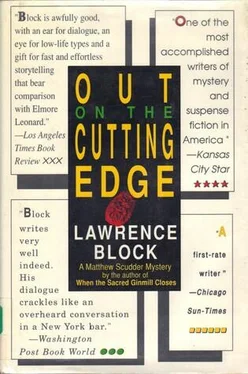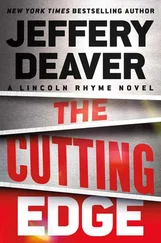“You picked him up at the bar last night.”
“I did.”
“And drove up to Ulster County, I think you said. To the farm.”
“Yes.”
“And you were up all night.”
“I was. It’s a long drive there and a long drive back, and I wanted to get to mass this morning.”
“The butchers’ mass.”
“The butchers’ mass,” he agreed.
“It must have been tiring,” I said. “Driving all the way there and back, and I suppose you’d been drinking.”
“I had for a fact, and it’s true it was a tiring drive. But, you know, there’s no traffic at that hour.”
“That’s true.”
“And on the way up,” he said, “I had him along for company.”
“And on the way back?”
“I played the radio.”
“I suppose that helped.”
“It did,” he said. “It’s a wonderful radio they put in a Cadillac. Speakers front and back, the sound as clear as good whiskey. You know, hers wasn’t the first body ever went in that hog pen.”
“Nor the last?”
He nodded, lips set, eyes like green flint. “Nor the last,” he said.
We left the meat market bar and walked over Thirteenth to Greenwich Street, then up to Fourteenth and east to where he’d left the car. He wanted to give me a ride uptown but I wasn’t going that way, and I told him it was easier for me to take the subway than for him to fight the traffic in lower Manhattan. We stood there for a moment. Then he clapped me on the shoulder and walked around his car to the driver’s side, and I headed off toward Eighth Avenue and the subway.
I rode downtown, and after I got off the first thing I did was look for a telephone. I didn’t want to call from a booth on the street. I found one in the lobby of an office building. It even had a door you could draw shut, unlike the open-air booths they have outside.
I called Willa first. We went through the hellos and the how are yous, and I cut into the middle of a sentence of hers and said, “Paula Hoeldtke’s dead.”
“Oh. You suspected that.”
“And now I’ve confirmed it.”
“Do you know how it happened?”
“I know more than I want to know. I don’t want to go into it over the phone. Anyway, I have to call her father.”
“I don’t envy you that.”
“No,” I said. “And I have other things to do, but I’d like to see you later. I don’t know how long I’ll be. Suppose I come by around five or six?”
“I’ll be here.”
I hung up and sat in the booth for a few minutes. The air got close and I cracked the door. Then after a while I closed it again and the little light came on overhead and I lifted the receiver and dialed 0 and 317 and the rest of his number, and when the operator came on I gave her his name and my name and told her I wanted to make a collect call.
When I had him on the line I said, “It’s Scudder. I spent a long time getting nowhere and then things loosened up all of a sudden. I don’t have everything yet, but I thought I’d better call you. It doesn’t look good.”
“I see.”
“In fact it looks pretty bad, Mr. Hoeldtke.”
“Well, I was afraid of that,” he said. “My wife and I, that’s what we were afraid of.”
“I should know more later today, or possibly tomorrow. I’ll call you then. But I know you and Mrs. Hoeldtke have been sitting around hoping for good news, and I wanted to tell you, well, that there isn’t going to be any.”
“I appreciate that,” he said. “I’ll be here until six, and then I’ll be home all evening.”
“You’ll hear from me.”
I spent the next several hours going in and out of a bunch of offices. The information I wanted was mostly available, but I had to shell out a few dollars here and there in order to get my hands on it. New York is like that, and a sizable percentage of the people who work for the local government regard their salaries as a sort of base they get in return for reporting to work every morning. If they actually do anything, they expect to be paid extra for it. Elevator inspectors expect a bribe to certify that an elevator is safe. Other functionaries expect payment before they’ll issue a building permit, or overlook a real or imagined restaurant violation, or otherwise do the job they’ve been hired to do. It must baffle people from out of town, although those who’ve lived in Arab countries probably find it familiar and comprehensible.
The favors I wanted were routine, and the baksheesh required was normal. I paid out around fifty dollars, maybe a few dollars more than that. And, gradually, I began to learn what I needed to know.
Just before noon I called the AA Intergroup number and told the volunteer who answered that I didn’t have my meeting book with me and needed a lunchtime meeting near City Hall. He gave me an address on Chambers Street and I got there while they were reading the preamble. I sat there for the rest of the hour. I don’t know if I heard a word anybody said, and I didn’t contribute anything myself beyond the physical fact of my presence and the dollar I put in the basket, but I left the room glad I’d come to it.
I had a hamburger and a glass of milk after the meeting and went to some more offices and bribed some more municipal employees. It was raining when I left the last office and walked to the subway, and it was clear when I got out at Fiftieth Street and walked up to Midtown North.
I got there around three-thirty. Joe Durkin was out. I said I’d wait for him, and I said that if he called in they should tell him I was waiting, and that it was important. Evidently he did, and got the message, because when he breezed in forty-five minutes later the first thing he did was ask what was so important.
“Everything’s important,” I said. “You know what my time is worth.”
“About a buck an hour, isn’t it?”
“Sometimes even more.”
“I can’t wait until I got my twenty years in,” he said. “Then I can move into the private sector and start knocking down those big bucks.”
We went upstairs and sat at his desk. I took out a slip of paper with a name and address and set it down in front of him. He looked at it, then at me, and said, “So?”
“Victim of a burglary and homicide.”
“I know,” he said. “I remember the case. We closed it.”
“You got the guy?”
“No, but we know who did it. Twitchy little junkie, pulled a lot of jobs the same way, over the rooftops and down the fire escapes. We couldn’t make a case against him for this one, but we hung a batch of other ones on him where we had good hard evidence. His Legal Aid lawyer plea-bargained him, but he still went away for — I don’t know, a few years. I could look it up.”
“But you didn’t have any hard evidence against him for this one?”
“No, but it fit close enough for us to close the file. We weren’t doing a whole lot with it anyway. No witnesses, no physical evidence. Why?”
“I’d like to see the autopsy report.”
“Why?”
“I’ll tell you later.”
“She was stabbed and she died of it. What else do you want to know?”
“I’ll tell you later. And while you’re at it—”
“What?”
I took out another slip of paper and laid it on his desk. “Some more autopsy reports,” I said.
He stared at me. “What the hell are you onto?”
“Oh, you know. Just working away like a dog at a bone. If I had more things to occupy me I wouldn’t hang on like this, but you know what they say about idle hands doing the devil’s work.”
“Don’t fuck around, Matt. Have you really got something here?”
“See if you can pull the autopsy reports,” I said. “And we’ll see what I’ve got.”
Читать дальше












